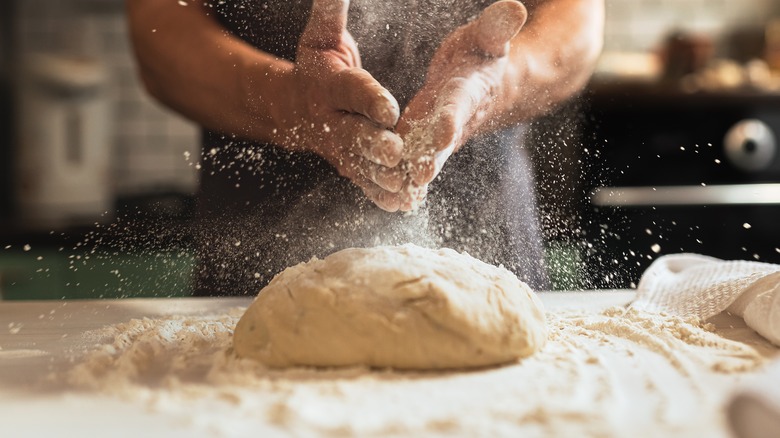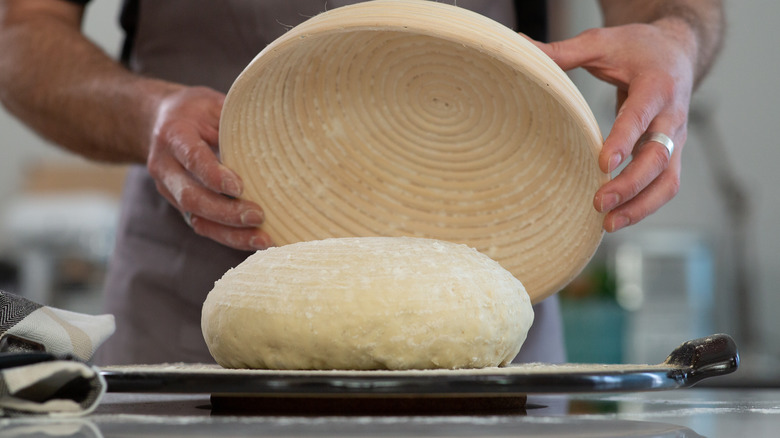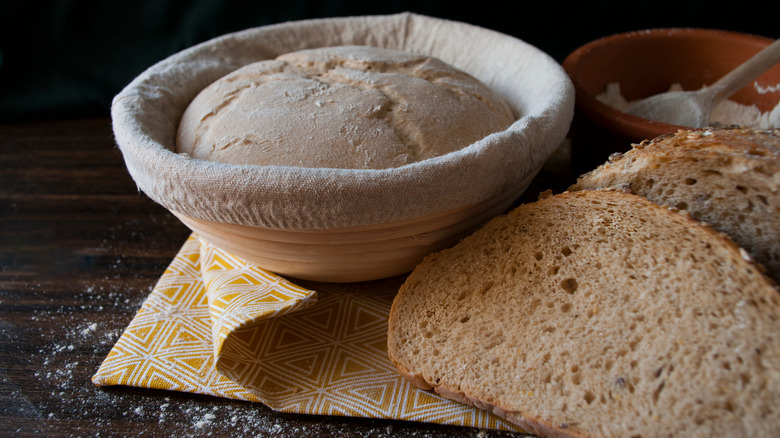The Smell Test To Check If Your Dough Is Overproofed
Anyone who has baked homemade bread before knows that proofing the bread is an essential stage in the process. As the yeast produces carbon dioxide, Sourhouse Bread & Pastries explains, the dough increases in size until it nearly doubles in volume, ultimately giving the bread both its height and airiness. If you try to rush proofing, things won't go so well.
In fact, Challenger Breadware notes that rushing proofing with result in your bread having a much tighter crumb and uneven air pockets. This equates to bread that is gluey instead of soft and fluffy. You may assume therefore that the longer you proof the bread, the better it will turn out, but the truth is, that's not the case.
When dough is overproofed, Sourhouse Bread & Pastries shares, it means that the dough doesn't have any more yeast or sugar to feed off. Then instead of a bread with a perfect crumb structure, you'll end up with one that is no better than one made with underproofed dough.
Luckily, there's an easy way to tell when your dough is done proofing. Don't worry, you don't need a special tool to measure this quantity.
Overproofed dough has a particular smell
Sometimes, bread dough gets overproofed because it rests for too long. Although some bakers will know this routine better than others, proofing can sometimes be a difficult balancing act. The specific duration each bread requires actually depends on the type of bread you're making and a number of other variables, including the temperature of your kitchen. As a result, the best way to tell when your bread is done proofing is by the look and smell.
According to Food Network, dough that's ready for baking will be about 50% larger than its original size. To keep track of how much it has grown, the outlet recommends initially covering the unproofed dough in plastic wrap, then marking the plastic with a marker to outline the dough. If the dough is overproofed, it will spill over the outline by more than double. For most situations, this is a decent test of the proofing quality. However, there's an even better answer available if you use another of your five senses.
A much more reliable indicator is the smell of the dough. Apollonia Poilâne, who runs the famous French bakery Poilâne, shared with MasterClass that properly proofed dough should never have an alcoholic smell. If you start to get even a whiff of an alcoholic substance, you should immediately cease proofing.
What happens when dough is overproofed?
The alcohol smell emitted by overproofed dough actually comes from alcohol. As Apollonia Poilâne explained to MasterClass, alcohol is the final byproduct of yeast. Yeast first turns into sugar, then carbon dioxide, and after a long proofing period, it gets converted into alcohol. Bread, however, needs gas bubbles, not alcohol. When the dough starts to smell like alcohol, it means the yeast is fully spent, which is exactly what you don't want as a breadmaker.
According to Modernist Cuisine, when this happens it means that the gluten strands have begun to weaken and can even collapse. Instead of puffing out as it bakes, it'll stay the same basic shape and may even deflate before you have the chance to put it in the oven. Fortunately, If you've realized your dough has overproofed before you have the chance to prevent it from happening, King Arthur Baking says there's one thing you can do without starting over.
Simply press the air out, reshape the dough, and then finally allow the dough to rise. This should salvage your dough, so it can bake effectively. Of course, if you always pay attention to the smell, you won't have to resort to any troubleshooting.


